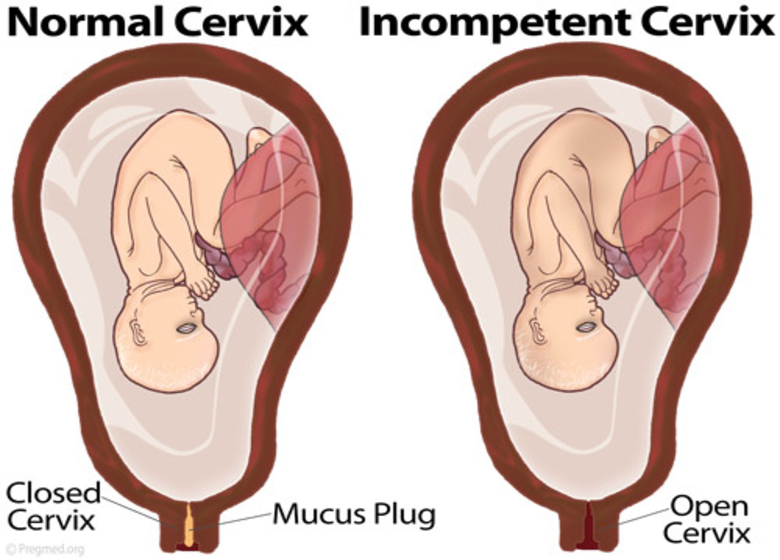In pregnant females, cervical incompetence or cervical insufficiency is the situation in which the cervix becomes fragile and opens up during early pregnancy. The cervix typically opens when and not before the child is about to be born. However, it opens up much sooner in females with an incompetent cervix, posing the danger of premature birth.
What is the Cervix?
The cervix is the uterus ‘ bottommost part that connects it to the vagina called the birth canal. The cervix stays closed during pregnancy, acting as a gate to keep the child within the uterus. Only when the child is full-term does the cervix efface (thins down) and dilate (open up) to allow the child in ordinary vaginal delivery through the birth canal.
What is the meaning of having Cervical Incompetence?
Cervical incompetence is a disorder in which the cervix becomes fragile and opens itself during the early phases of pregnancy. As the baby grows inside the uterus, it gains weight and begins to exert its weight on the cervix. If the cervix is not strong enough, it will give in to the pressure applied by the developing baby. An incompetent cervix can lead, if not diagnosed in time, to a preterm baby or even a miscarriage, especially during the second trimester. It is not a very common condition and occurs in just one in a hundred pregnant women.
Symptoms Of Cervical Incompetence:
If you have an incompetent cervix, you may not have any signs or symptoms during early pregnancy. Some women have mild discomfort or spotting over the course of several days or weeks starting between 14 and 20 weeks of pregnancy.
Look for the following:
- A feeling of pelvic stress
- A new backache
- Abdominal cramps
- A change in vaginal discharge
- Light vaginal bleeding
Causes Of Cervical Incompetence:
In pregnant females, there are different causes of an incompetent cervix. They are,
- Malformations of the cervix from birth, which may imply a deviation from the ordinary cervix or uterus shape with which the person is born.
- Any harm caused to the cervical walls, such as dilation and curettage (D and C), cancer detection biopsy or cervical cancer LEEP therapy.
- Any trauma of a prior pregnancy to the cervix.
- Previous exposure to Diethylstilboestrol (DES) is known to cause reproductive tract issues to prevent miscarriages during pregnancy.
- The history of miscarriages in the second trimester, with no known reason.
Complications Of Cervical incompetence
If no timely care and therapy is provided to a female with an incompetent cervix, she may experience many problems during her pregnancy, such as:
Having a preterm baby:
If the cervix opens during the second trimester’s later stage, there are high chances that the baby will be born much ahead of time. The child will need life support and an incubator in such a situation until it develops to a point where it can operate separately.
Stillbirth:
A loss of a pregnancy that occurs after week 20 if is called a stillbirth. When the child is born very young, it generally has no growth and development outside the uterus to survive.
Miscarriage:
Babies born to mothers whose cervix becomes fragile, generally have a miscarriage between the 18th and 22nd week. Unless it is born before 23 weeks of pregnancy, a fetus can not survive.
While these complications occur, timely remedial interventions such as drugs, surgical procedures, and rest can assist many mothers to deliver their full-term children effectively.
Prevention
You can’t avoid an incompetent cervix— but you can do a lot to encourage a good, full-term pregnancy. For instance:
Seek regular prenatal care:
Prenatal visits can assist monitor your doctor’s health and the health of your baby. Mention any signs or symptoms that may affect you, even though they may seem silly or unimportant.
Eat a healthy diet.
More folic acid, calcium, iron, and other essential nutrients will be needed during pregnancy. Any nutritional gaps can be filled by a daily prenatal vitamin — ideally beginning a few months before conception.
Gain weight wisely:
Gaining the correct weight can promote the health of your baby. For females who have a good weight prior to pregnancy, a weight gain of 25 to 35 pounds (about 11 to 16 kilograms) is often suggested.
Avoid risky substances:
If you’re smoking, stop. There are also off-limits to alcohol and illegal drugs. Additionally, before taking any medicines or supplements, get your doctor’s OK — even those accessible over-the-counter.
If you have had an incompetent cervix during one pregnancy, you are at risk of premature birth or loss of pregnancy in later pregnancies. If you are considering getting pregnant again, talk to your doctor about the risks and what you can do to promote a healthy pregnancy.













